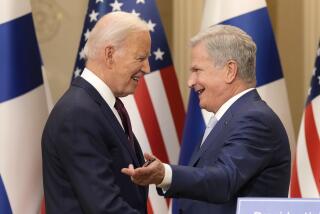Ready for New Steps in Gulf, Bush Says : U.S. policy: Remarks at a political fund-raiser reaffirm stand taken at Helsinki summit.
- Share via
SAN FRANCISCO — President Bush said Wednesday that if the current economic embargo of Iraq and other efforts to seek a peaceful resolution to the Persian Gulf crisis fail, “we are prepared to take additional steps.”
Although White House officials sought to play down the President’s remarks--because they echoed comments he made in Helsinki 10 days earlier when he met Soviet President Mikhail S. Gorbachev--they had the effect of throwing down, once again, a challenge to Iraqi President Saddam Hussein.
In Helsinki, the two leaders had agreed that they were prepared to go beyond the current round of sanctions that have cut Iraq’s income-producing oil shipments, as well as crucial food imports and weapons trade, in the international effort to force Hussein to pull occupying troops out of Kuwait.
In a joint statement issued after their daylong summit in the Finnish capital, Bush and Gorbachev said that, if the current steps fail, “we are prepared to consider additional ones consistent with the U.N. Charter.” The sanctions, prohibiting trade with Iraq, have been implemented under the direction of the U.N. Security Council.
Later that day, Secretary of State James A. Baker III said that Bush was referring at the time to additional economic sanctions. But he also said that, because the joint statement did not rule out military force as an option and because it raised the prospects of additional action, it had the effect of advancing the possibility that a military course eventually could be taken.
Since then, Bush and other senior Administration officials have appeared extremely reluctant to suggest that there might be military steps. Thus, Bush’s remarks Wednesday could be interpreted as raising that flag again.
But even as Bush appeared to hold out the prospect for a military solution, a senior Administration official, who insisted on anonymity, seemed to moderate that message, saying as Bush arrived here after an overnight stay in Los Angeles that the President had no specific steps in mind.
Robert M. Gates, Bush’s deputy national security adviser, said, “We’ve always said we would keep our options open if the sanctions didn’t work.”
Speaking Wednesday at a fund-raising luncheon for Sen. Pete Wilson’s gubernatorial campaign, Bush repeated the three primary goals of the nations aligned against the Aug. 2 invasion:
Complete Iraqi withdrawal from Kuwait.
Restoration of Kuwait’s “legitimate” government, the royal Sabah family that was overthrown by the invasion.
Freedom for the vast numbers of foreign hostages being held in Iraq, many of them as “human shields” to protect against attacks on sensitive military sites.
About 82 Americans are believed being held as prisoners in Iraq, and another 1,400 are trapped in Iraq and Kuwait.
“Humanity will tolerate nothing less” than implementation of these goals, Bush said.
“If Iraq does not meet these non-negotiable conditions, then its isolation will not end,” the President said. “We are, as I’ve said before, prepared to take additional steps if sanctions and the quest for a political resolution do not work.”
He inserted the phrase, “as I’ve said before,” into his prepared text, after reporters, given a copy of the speech by the White House before Bush spoke, questioned whether the President was sending a new, toughened signal.
The President has refused to say how long he would wait to determine whether the sanctions are working before opting for increasing the pressure--either through additional sanctions, tighter enforcement of the existing embargo by trying to crack down on air shipments to Iraq or by unleashing the more than 150,000 U.S. troops deployed throughout the region. About 360,000 Iraqi soldiers are now stationed in Kuwait and southern Iraq.
U.S. officials repeatedly have said over the last several weeks that the sanctions are beginning to bite, causing shortages and rationing in Iraq. But while these officials have said that it could be many months--possibly a year--before the sanctions would force Hussein to retreat, other officials have suggested that military action could come much sooner.
Although the joint U.S.-Soviet declaration in Helsinki leaves open the possibility of further steps under the U.N. Charter, it is not clear whether the charter, in effect, would provide a blessing for military operations. In addition, such a move would be likely to create sizable cracks in the impressive display of international unity that greeted the initial embargo. Indeed, Gorbachev has appeared considerably more reluctant to move toward a military resolution than has Bush.
Bush described the Helsinki statement as “extraordinary” and said: “It is an absolutely unparalleled message of solidarity--a clarion call for Iraq to comply, immediately and completely, with the five resolutions which had been so urgently ordered by the U.N. Security Council. It heralds a new era for our world--the Soviet Union and the United States standing together in vigorous condemnation of an outrageous aggression.
More to Read
Sign up for Essential California
The most important California stories and recommendations in your inbox every morning.
You may occasionally receive promotional content from the Los Angeles Times.













